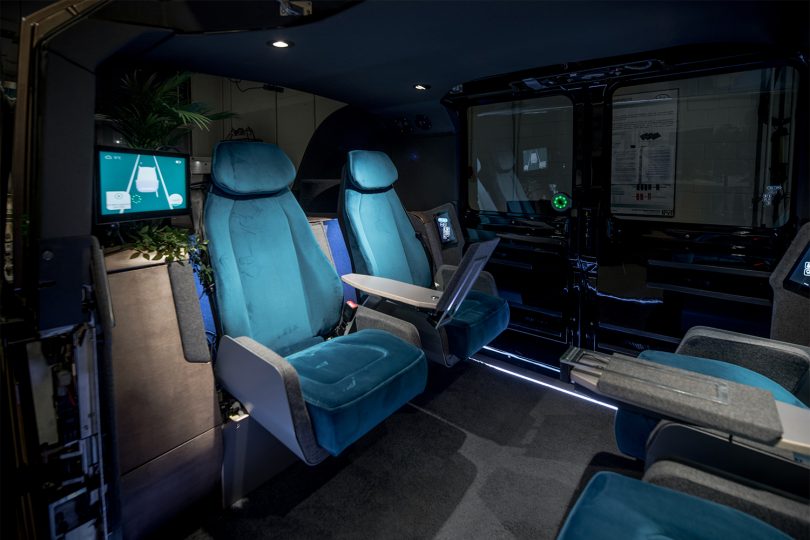Prototype for Testing Autonomous Driving Functions Rollout of the modular test platform in the UNICARagil project
After three years of intensive work, the time has finally come – the first prototype of the UNICARagil family is on its own wheels: With the autoCARGO, the first vehicle with its own driving system has left the workshop halls and is now available for testing autonomous driving functions. Three more vehicles for other use cases will follow soon, including the use case of the automated family vehicle autoELF developed by the Braunschweig Technical University. The Braunschweig researchers are also working on a safety concept for automated driving.
The UNICARagil platform forms the basis for various add-on modules: Depending on the vehicle’s intended use, these are tailored for local passenger transport and goods transport, for example. The now completed autoCARGO driving prototype is based on a vehicle structure that has been redesigned from the ground up. Likewise, the electronics architecture has been newly developed, designed and manufactured, including dedicated control units for drive and steering control.
Modularity throughout
With the completion of hardware integration, an important milestone in the project has been reached. The ready-to-drive platform has been “married” to a body module and all mechatronic components required for driving have been integrated. The special feature of this driving platform is its consistent modularity and the integration of novel dynamics modules that implement the drive, brake and steering for each individual wheel in an electronically networked manner with steering angles of up to 90 degrees.
Now that the first prototype is standing on its own wheels and can move through its own power, other core issues of the project are gaining attention: The vehicle will be fully automated in the coming months. To this end, the sensor modules will be equipped and “cerebrum” (the computer for interpreting the environment, behavior planning and decision-making, and trajectory planning) and “brain stem” (the computer for implementing the trajectory transmitted by the cerebrum) will be integrated and networked. The software and automated driving functions developed in the project will gradually be put into operation, tested, and proven in comprehensive driving trials. The issue of safety plays a prominent role in the project. The interior will then be added, which will not be completed until the end of the project.
Driverless family vehicle
A total of four different variants are being prototyped in the UNICARagil project. At the Technical University of Braunschweig, the Institute of Control Engineering is developing a vehicle in the autoELF use case. This is a driverless family vehicle. autoELF is intended to independently carry out everyday journeys within a multigenerational family. A chaperone capable of driving, which is necessary for the transport of persons not capable of driving with a conventional passenger car, will then no longer be required. In this way, the vehicle will also help children or physically impaired persons to achieve greater independence in everyday life. At the same time, relatives who previously carried out journeys for the purpose of companionship will be relieved. In addition to integrating the vehicle as seamlessly as possible into the family’s everyday life, particular focus is therefore placed on vehicle access and interior design.
Safety concept for automated driving
In addition to developing an automated family vehicle, the TU Braunschweig is focusing on vehicle safety. The Institute of Control Engineering and the Institute of Data Technology and Communication Networks are focusing on the creation of a safety concept for the automated driving function. Based on experience from previous projects, the considerations go beyond the focus of “functional safety” of ISO 26262. Central challenges lie in the inherent uncertainties of automated driving, which stem from the perception of the environment, the prediction of the behavior of other road users, incomplete requirements, and a limited depth of testing. A major contribution to the planned safety concept is provided by self-awareness, in which the current capabilities of the vehicle are to be determined via an aggregation of quality measures of the individual system components. This collected data can then be used by other system components to adapt the vehicle behavior to the current capabilities of the vehicle.
About the project:
UNICARagil provides an important contribution to the design of tomorrow’s mobility. Fully automated and driverless vehicles are being researched in the project. The research focuses on novel hardware and software architectures to realize fully driverless vehicles and to continuously update their driving functions.
As part of the BMBF-funded UNICARagil project, Germany’s leading universities in the automotive sector have joined forces with selected researchers from the industry to rethink the vehicle and its development processes in a revolutionary way. The project consortium, led by Prof. Lutz Eckstein, Institute of Automotive Engineering at RWTH Aachen University, is designing disruptive, modular and agile vehicle architectures as part of the project. Based on the developed platform, four different use cases ranging from automated family vehicles to mobile packing stations are prototyped and secured.
Members of the consortium are RWTH Aachen, TU Braunschweig, TU Darmstadt, Karlsruhe Institute of Technology, Technical University of Munich, University of Stuttgart, University of Ulm and University of Passau as well as the industrial partners ATLATEC GmbH, flyXdrive GmbH, iMAR Navigation GmbH, IPG Automotive GmbH, Schaeffler Technologies AG & Co. KG and VIRES Simulationstechnologie GmbH. Furthermore, the project is supported by the associated partners Maxion Wheels Holding GmbH and Valeo Schalter und Sensoren GmbH. The project is funded by the BMBF with a total of 26 million euros and has a duration of 48 months.

